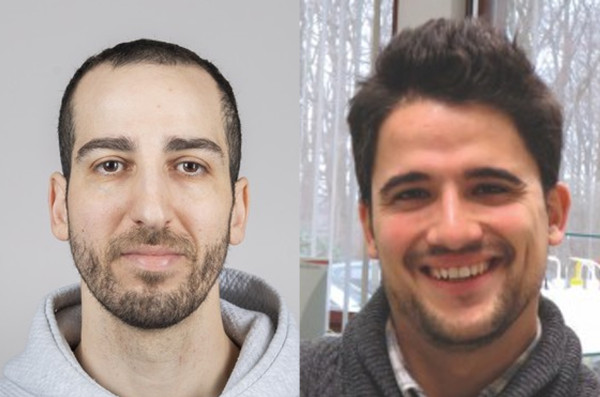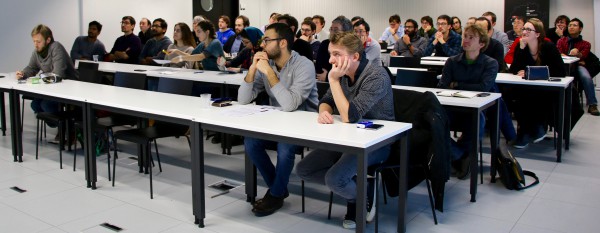MARVEL Junior Seminar — June 2024

Each seminar consists of two presentations of 25 minutes each, allowing to present on a scientific question in depth, followed by time for discussion. The discussion is facilitated and timed by the chair.
Pizzas will be served after the seminars in order to facilitate discussions based on the talks just presented.
Onsite participation
12:15 — Seminars take place in EPFL room Coviz2 (MED 2 1124)
~13:15 — Pizzas will be served in the MED building atrium, second floor
Online participation
Starting at 12:15:
https://epfl.zoom.us/j/68368776745
Password: 1923

Abstracts
Talk 1 — Towards seamless interoperability of open research data from experimental/simulation workflows
Edan Bainglass1, Peter Kraus2,6, Francisco F. Ramirez3, Enea Svaluto-Ferro2, Loris Ercole3, Benjamin Kunz2, Sebastiaan P. Huber3, Nukorn Plainpan2, Nicola Marzari1,3, Corsin Battaglia2,4,5, Giovanni Pizzi1,3
1Laboratory for Materials Simulations (LMS), Paul Scherrer Institut
2Materials for Energy Conversion, Empa, Dübendorf
3Theory and Simulations of Materials (THEOS), EPFL
4Dept. of Information Technology and Electrical Engineering, ETH Zurich
5Institute of Materials (IMX), EPFL
6Technische Universitat Berlin, Centre for Advanced Ceramic Materials, Germany
Scientific discovery via experimentation alone can be cumbersome and costly. Thanks to theoretical and computational advances, simulations can be quantitatively predictive and provide insight at a fraction of the cost. Simulation-assisted analysis of experimental observations can thus further accelerate scientific discovery. Automated high-throughput simulations carried out by modern workflow management systems (WFMSs) have been a go-to approach in recent years, particularly in materials science. The AiiDA WFMS has historically managed complex simulation workflows, storing all the steps (provenance), thus ensuring reproducibility. Recently, AiiDA has been shown equally successful in automating experimental workflows for battery cycling, where ongoing research is exploring end-of-life battery optimization via a genetic algorithm. A similar approach is presently considered for an internal PSI collaboration on thin-film growth automation via optimization of growth parameters. In this presentation, we first briefly discuss the integration of AiiDA with experimental setups. We then dive into the complexities of managing open research data (ORD) from mixed experimental/simulation workflows across research data management (RDM) platforms in a FAIR manner, stressing the current challenges. Finally, we highlight the efforts of the PREMISE Establish project (of the ETH Board ORD program) towards facilitating platform-agnostic interoperability of open and FAIR research data via a newly conceptualized ORD transfer protocol leveraging ontologies and knowledge graphs.
Talk 2 — Charting the landscape of Bardeen-Cooper-Schrieffer superconductors in experimentally known compounds
Marnik Bercx1, Samuel Poncé2, Junfeng Qiao3, Yiming Zhang2, Giovanni Pizzi1,3, Nicola Marzari1,3
1 Laboratory for Materials Simulations (LMS), Paul Scherrer Institut
2 Institute of Condensed Matter and Nanosciences, Université catholique de Louvain, Belgique
3 Theory and Simulations of Materials (THEOS), EPFL
A computational search for novel Bardeen-Cooper-Schrieffer superconductors is challenging due to the high cost of calculating the electron-phonon couplings that determine conventional superconductivity. The EPW (Electron-Phonon using Wannier functions) code can perform precise interpolations for the needed electronic and phonon dispersions at a much-reduced cost, but a large-scale screening would still require manual construction of the Wannier functions. Here, we combine recent developments in automated Wannierization with the AiiDA computational infrastructure to enable a high-throughput search for novel superconductors, starting from the Materials Cloud 3-dimensional structure database (MC3D). We first compute the Allen-Dynes critical temperature for ~4,500 non-magnetic metals, using a direct coarse sampling of the electron-phonon couplings. For the most promising materials, we run a subsequent EPW workflow to obtain a high-quality dataset for over 250 dynamically stable structures, including spectral functions and Migdal-Eliashberg critical temperatures, from which we identify several novel candidates that can be promising for further experimental studies.
Check the list of the next MARVEL Junior Seminars here.
Low-volume newsletters, targeted to the scientific and industrial communities.
Subscribe to our newsletter